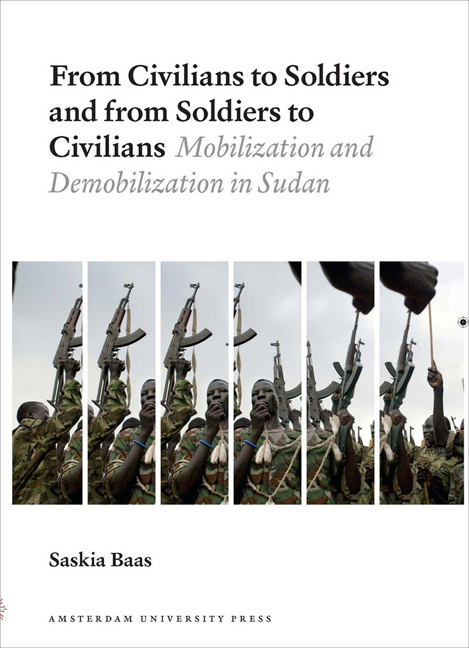Book contents
- Frontmatter
- Dedication
- Contents
- Acknowledgements
- List of Acronyms
- 1 Introduction
- 2 Recruitment
- 3 Becoming a soldier
- 4 At War's End
- 5 DDR Policies and Realities in Sudan
- Concluding Remarks
- Appendix I: Checklist Interviews Former Combatants
- Appendix II: Example of an Interview Report
- Notes
- Bibliography
- Index
Appendix II: Example of an Interview Report
Published online by Cambridge University Press: 15 January 2021
- Frontmatter
- Dedication
- Contents
- Acknowledgements
- List of Acronyms
- 1 Introduction
- 2 Recruitment
- 3 Becoming a soldier
- 4 At War's End
- 5 DDR Policies and Realities in Sudan
- Concluding Remarks
- Appendix I: Checklist Interviews Former Combatants
- Appendix II: Example of an Interview Report
- Notes
- Bibliography
- Index
Summary
[with all details enabling tracing of respondent deleted]
Background
41 years old, Uduk tribe, from [name of village], [name of locality], education until fifth class primary school (Arabic school), Christian, married, three children
Affiliated to the SPLA since 1986 – Rank: colonel
Not in DDR
Before joining the movement
I am from [name of village] in [name of locality]. My father is a farmer. All of my tribe are farmers. None of us work in the government. There is only one Uduk who was in the government army and he became a brigadier. But when they found out that he is Uduk, they fired him. In the civil service we also had very few from our tribe. We were farmers with small gardens [“how”], not mechanized farming. 99% from Uduk tribe is like this.
We had a big problem in our area. In the summer we prepare our fields. You work on the land from March-April up to December. But we have nomads. They enter the garden with their cattle and in only a few minutes they eat everything. But then when you go to the police, the police will agree with them. They will say that [the nomads] bought the land and then they will put the Uduk in prison. When you fight with those who ruined your garden, they will put you in prison. We know that the only one who has cattle in this area is the Ingessana. But we don't have problems with them. So it was clear to us that it was the government who let the nomads come to our land. And they know exactly when to come, because simsim [sesame] grows early in the year. When we were growing up, these problems were occurring. When we joined the SPLA, we discovered that there is a problem in Sudan with the regime.
In 1981, I was dismissed from school because I had a problem with the headmaster. After that, in 1984, I got married. Our first child was born in 1985, but died after seven days. The second-born reached four years and then died. The third-born was a girl and she died in Nasir as a baby. She died because there was not enough food. I was separated from her and her mother after the SPLA split in Nasir. They ended up on the wrong side of the river.
- Type
- Chapter
- Information
- From Civilians to Soldiers and from Soldiers to CiviliansMobilization and Demobilization in Sudan, pp. 209 - 212Publisher: Amsterdam University PressPrint publication year: 2012



